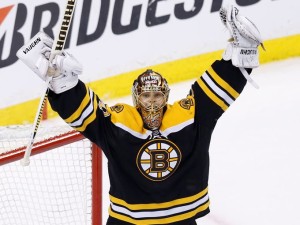 As the Boston Bruins punched their ticket for the NHL Stanley Cup Finals this past weekend, TV commentators quickly reminded viewers about how close they came to elimination at the hands of the Toronto Maple Leafs in the Conference Quarter-Finals. Without question, Game 7 was the most dramatic contest of the entire Playoffs. Surprisingly, a personal, long-form conversation proved to be a vivid demonstration of how Twitter and Sport can best combine to elevate the game-watching experience.
As the Boston Bruins punched their ticket for the NHL Stanley Cup Finals this past weekend, TV commentators quickly reminded viewers about how close they came to elimination at the hands of the Toronto Maple Leafs in the Conference Quarter-Finals. Without question, Game 7 was the most dramatic contest of the entire Playoffs. Surprisingly, a personal, long-form conversation proved to be a vivid demonstration of how Twitter and Sport can best combine to elevate the game-watching experience.
It Began Innocently Enough
After a Bruin;’s loss in Game 2, a Follower posted a cavalier tweet , hinting that Boston’s defeat was somehow a turn of bad luck versus a strong effort by the Leafs. Naturally, my response was swift, and in hindsight, somewhat severe. I’d fallen into the Twitter trap – I’d become a sports “blow-hard”, quick to pontificate, criticize and generally spread negativity. Fortunately, this Follower showed greater maturity and this is where the relationship turned. Rather than fire back angrily, my digital friend responded in a manner that encouraged further connection by admitting he was “grasping at straws”.
From this moment on, our digital relationship evolved and grew more meaningful. I reached out before the next game, asking his opinion, sharing my thoughts. Our conversations, albeit short and sweet, gave me insight into the perspective of an intelligent, rival fan. I could envision him cheering on David Krejci, his personal pick to excel, while the Bruins took a 3-1 stranglehold on the series. The fact he was correct only served to strengthen my respect and the connection between us. I looked up the company he led, eager to learn more and more than likely to conduct business together if it made sense.
Broadcasters Search for Perfect Twitter Integration
Maple Leaf Square was the social hub of the Toronto during the Playoffs, attracting thousands of rabid fans into a small area outside the ACC to cheer on their beloved Leafs. However, creating a social hub on TV has proven to be somewhat more elusive. Twitter’s ability to drive a conversation and to react in real time has Network executives salivating at the possibility of “owning” that conversation. “The two-screen experience is real. It’s how a lot of people are following live events now,” said Patrick Stiegman, ESPN.com’s vice president and editor-in-chief. However, speed at which many sports unfold makes it nigh on impossible to display tweets that don’t immediately seem “stale”. So for the moment, sports networks are simply committing more resources follow sports industry tweeters and aggregating tweets as a news-gathering tool. They’ve also discovered how to leverage Twitter to promote their own online content.
Drawing on the Leafs-Bruins experience, the integration of Twitter and live sports events seems most powerful in long-format conversations, where the action unfolds over a series of contests like a playoff series, the NFL Draft or more leisurely paced sports like baseball or cricket. This allows for more thoughtful, more insightful twitter content and serves to strengthen the connections between passionate tweeters with high sports IQs.
By the time Game 7 of the Leafs-Bruins series rolled around, I was sincerely considering heading down to join the massive throng gathered in The Square to really feel the excitement of the crowd’s reaction to every save and every goal. But alas, logistics got in the way. While no substitute for the live experience, my digital connection with my Bruins fan – and the pure excitement of Game 7 – had me engaged in the game like never before. While the final result was entirely less than satisfying, the experience of sharing the moment with a rival, intelligent and insightful sports fan almost made up for it.
Almost…
PS Many thanks to Paul Costello. I wish the Bruins good luck against the Chicago Blackhawks in the Stanley Cup Final.
Comment below, like Sports Networker on Facebook and Follow us on Twitter @SportsNetworker


I agree that live twitter updates at sporting events may work for the “leisurely paced sports” such as cricket or baseball. The main problem I can see with this for cricket is the demographic who follow cricket are not necessarily social media users. Cricket is grounded in tradition and as a result it is not as open as sports to trying new things. There are some exceptions obviously, the IPL integrated twitter into their campaign with massive success, but that was in India were the cricket fans are not necessarily the same as the English cricket fan, it was in the 20/20 form of the game (one that some traditional cricket fans turn their noses up at).
Baseball is a lot more accepting of new technology, I believe many teams even have social media nights. I just think it will take a while before cricket turns on to anything similar.
This is very interesting, You are an excessively professional blogger.
I’ve joined your rss feed and look forward to in quest of extra
of your wonderful post. Additionally, I’ve shared your
site in my social networks
Just wish to say your article is as amazing. The clarity in your post is just nice and i could assume you are
an expert on this subject. Well with your permission let me to grab your RSS feed
to keep up to date with forthcoming post. Thanks a million annd please continue the gratifying work.